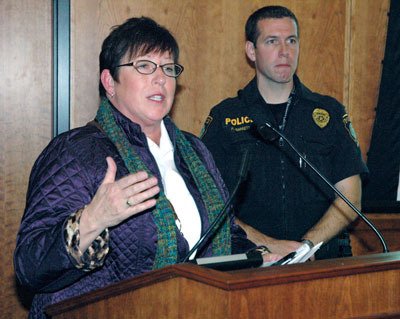ARLINGTON — Arlington Police Officers Peter Barrett and Jason Rhodes took questions from Arlington business owners and city residents during a crime prevention seminar on Tuesday, Oct. 29, that focused largely on the linked problems of vagrancy and drug addiction in town.
Both officers have patrolled the streets of Arlington for more than a decade each, and both have seen the growth of not only illegal drug use in the area, but also the local homeless population, which Rhodes estimated to be more than 100 within the Arlington city limits alone.
“A big reason for that is heroin,” Rhodes said. “They’re feeding their addiction, and with joblessness, they turn to crime. They’ll do whatever they can to get their drugs.”
According to Barrett, heroin and methamphetamine use is on the rise, but drug and alcohol abuse of various kinds are a common denominator among the homeless, whom he noted already receive support ranging from state-funded food programs to community charities providing shelter and clothing.
“So the question becomes, why are they still begging?” Barrett said.
Rhodes pointed out that the homeless and drug addicts drain a number of resources, from the EMS and ER services they consume when they overdose, to the public safety, property values and quality of life that they lower. Barrett then listed the factors that make Arlington an attractive convergence point for those populations, from the number of state-funded resources within its city limits to its easy accessibility via Interstate 5, State Routes 530 and 531, and Highway 9.
Rhodes clarified that, while pedestrians in motion cannot be legally trespassed, once someone stops walking and stands on the sidewalk in front of a property, that property owner can trespass that person.
When Kim Speed asked if apartment owners can be held accountable for the drug-dealing on their property, Rhodes informed her that police do address such issues with property owners, and put pressure on them to evict certain tenants.
Adam Ankenman struck a note of balance in his comments, suggesting that police push for creative sentencing for top offenders, while also asserting that the homeless “have a right to exist.” While Rhodes reassured Ankenman that the police treat the homeless with respect, while also “still hold[ing] them accountable,” he joined Barrett in explaining how the identification and prioritization of top offenders has allowed the police department to push for unique penalties.
“We actually got $1 million bail for a residential burglar,” Rhodes said.
“We have to be careful when we pull that card,” Barrett said. “But this person had done hundreds of vehicle prowls within a couple of weeks, so we told the prosecutors, if there’s ever a case where you want to hammer someone, this is it.”
Both officers called upon community members to call 911 early and often about anything that seems suspicious to them, even if it turns out to be nothing, and welcomed them to take part in not only business and block watches, but also the citizens’ patrol group. When asked what would be required to restore the police department’s Pro-Act Team — which both Rhodes and Barrett had mentioned, while acknowledging that police staffing levels traditionally put them in the position of being reactive rather than proactive in addressing crime — Arlington City Council member Debora Nelson took to the podium.
“We’re currently choosing the language for a ballot measure in April,” Nelson said. “If voters approve it, it will add 50 cents of property tax per every $1,000 of assessed value for public safety, and the number one thing that I’ve wanted to use that money for is to restart the Pro-Act Team. I’ve seen the good effects they’ve had.”
When Rhodes asked those in attendance whether they’d be willing to meet again in six months to discuss these matters further, the crowd chorused almost unanimously, “Sooner.”







